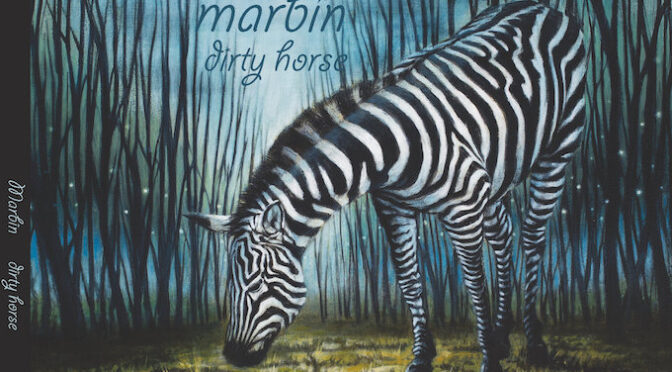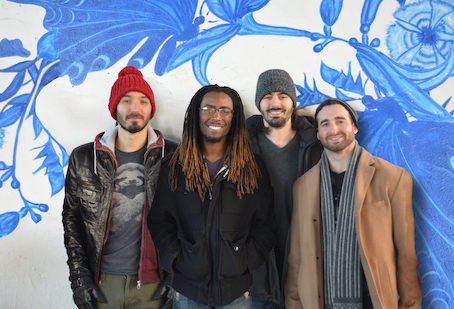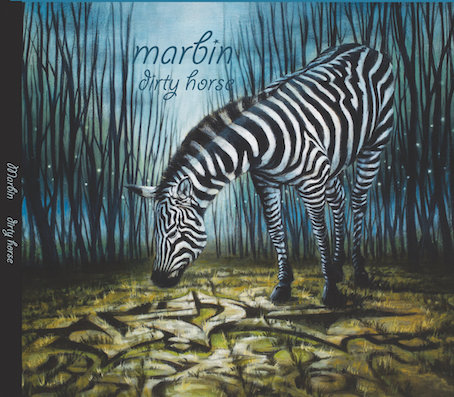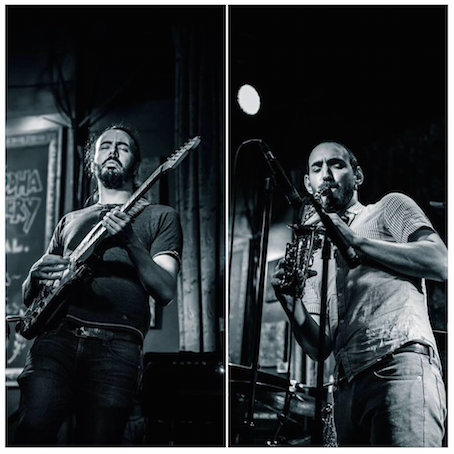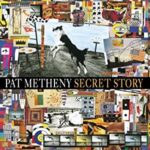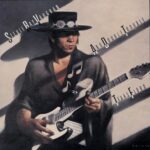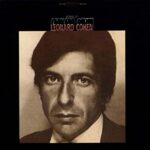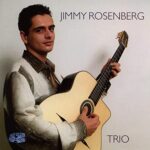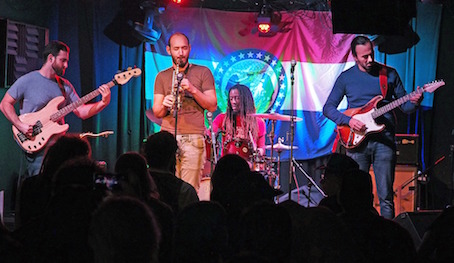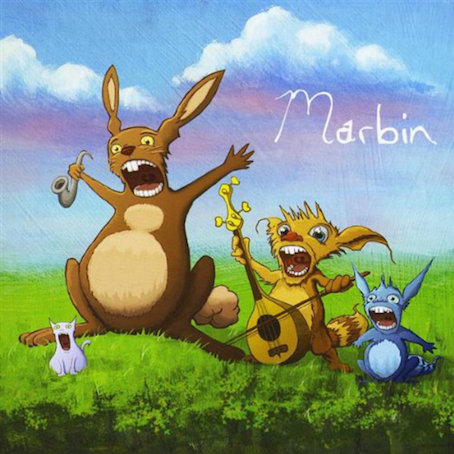EXCLUSIVE: INTERVIEW WITH DANI RABIN OF MARBIN !!
“I Feel Like The Number One Problem With Fusion Music Today Is That People With The Groove Or The Chords First And Their Melodies End Up Being Something That Fits. A Melody Is The Center. Everything Else Should Be Bent To Fit It.”
DISC REVIEW “DIRTY HORSE”
「僕たちは常にメロディから始めるんだ。コードやハーモニーはフレームだけど、結局メロディーを生み出さないとキャンバスの形がわからないからね。今のフュージョン音楽で一番問題なのは、グルーヴやコードが先にあって、メロディがその場しのぎで終わってしまうことだと思う。でもそうじゃないだろ?メロディーは中心だよ。それ以外のものは、メロディーに合わせていかなければならないんだ」
MAHAVISHNU ORCHESTRA や WEATHER REPORT, そしてもちろん Miles Davis など、かつて “エレクトリック・フュージョン” が革命的で、刺激的で、しかしキャッチーな音楽の花形だった時代は確実に存在しました。日本でも、Casiopea や T-Square がマニア以外にも愛され、運動会で当たり前に流されるという “幸せな” 時代がたしかにあった訳です。
なぜ、エレクトリック・フュージョンは廃れたのか。あの Gilad Hekselman や Avishai Cohen を輩出したジャズの黄金郷、イスラエルに現れた MARBIN のギタリスト Dani Rabin は、率直にその理由を分析します。変わってしまったのは、”メロディーだ” と。
「ファラフェル・ジャズ (ファラフェルとは中東発祥の揚げ物) と呼ばれるものは、イスラエルの音楽を戯画化し、わざわざ最大の “決まり文句” を取り上げて音楽の中に挿入し、人工的に一種のエキゾチックな雰囲気を作り出すもので、僕はいつも軽蔑しているんだ。イスラエルは人種のるつぼで、様々なバックグラウンドを持った人々が集まっている。僕は作曲家として、自分の中にある音楽をそのまま出していけば、民族的なスタンプが有機的に、そしてちょうど良い形で自分の音楽に現れてくると感じているからね」
最近のフュージョンの音楽家が思いついたメロディにコミットできないのは、それが自分を十分に表現できていないメロディだから。そう Dani は語ります。たしかに、近年ごく僅かとなったジャズ・ロックの新鋭たち、もしくはフュージョンの流れを汲んだ djent の綺羅星が、予想可能で機械的なお決まりの “クリシェ” やリズムの常套句を多用しているのはまぎれもない事実でしょう。テクニックは一級品かもしれない。でも、それは本当に心から出てきたものなのだろうか? MARBIN は “Dirty Horse” で疑問を投げかけます。
オープニングの “The Freeman Massacre” で、MARBIN の実力のほど、そして彼らが意図するメロディーの洗練化は十二分に伝わります。Dani とサックス奏者 Danny Markovitch はともに楽器の達人で、バンドはグルーヴし、シュレッドし、卓越した即興ソロを奏でていきます。フュージョンの世界ではよくワンパターンとかヌードリングという言葉を聞くものですが、彼らの色とりどりのパレットは退屈とは程遠いもの。
何より、この複雑怪奇でしかし耳を惹くメインテーマは、”ビバップは複雑なメロディとソロのシンプルなグルーヴで成り立っている。それが正しい順序” という Dani の言葉を地でいっています。”Donna Lee” ほどエキサイティングで難解なテーマであれば、ジャコパスも安心して浮かばれるというものでしょう。
一方で、二部構成のタイトルトラック “Dirty Horse” では、バンドのロマンティックな一面が浮き彫りになります。Dani と Danny のユニゾン演奏は実に美しく、目覚ましく、そして楽しい。両者が時に同調し、時に離別し、この哀愁漂う異国の旋律で付かず離れず華麗に舞う姿は、エレクトリック・フュージョンの原点を強烈に思い出させます。
さらに二部構成の楽曲は続き、”Sid Yiddish” のパート1でバンドは少しスローダウンしながら、Danny の長いスポットライトで彼らの妖艶な一面を、チベットの喉歌で幕を開けるパート2で多彩な一面を印象づけます。能天気なカントリー調から急激に悲哀を帯びる “World Of Computers” の変遷も劇的。正反対が好対照となるのが MARBIN のユニークスキル。
驚くことに、このアルバムは2021年8月にスウィートウォーター・スタジオにおいて、たった3日でレコーディングされています。これほど複雑怪奇で豊かな音楽を3日で仕上げた事実こそ、MARBIN がフュージョンの救世主であることを物語っているのかも知れませんね。MAHAVISHNU のようなレジェンドのファンも、THANK YOU SCIENTIST のような新鋭のファンも、時を超えて手を取り合い、共に愛せるような名品。もちろん、メタル・ファンは “Headless Chicken” でその溜飲を下げることでしょう。
今回弊誌では、日本通の Dani Rabin にインタビューを行うことができました。「僕がイスラエルのサウンドで本当に好きだったのは、東欧の影響とショパンのような和声進行がミックスされている音楽なんだ。というか、僕の好きな世界中の音楽には、そうした共通点が多くあるんだよね。 Piazzolla や Django Reinhardt と、僕が好きなイスラエルの音楽は、ある意味、思っている以上に近いんだよね」 どうぞ!!
MARBIN “DIRTY HORSE” : 10/10
INTERVIEW WITH DANI RABIN
Q1: First of all, you are from Israel, what kind of music did you grow up listening to in your home country?
【DANI】: As a teenager, when I first started getting interested in music, I was mostly listening to 80’s and 90’s heavy metal music. Bands like Metallica, Megadeth and Pantera were my first big loves. After a while, I found that I was fast forwarding the music through the songs and only really listening to the guitar solos so I started looking for music that had more of that. The next transition for me was into the “shredders” and instrumental music. People like Steve Vai, Yngwie Malmsteen, Joe Satriani, Nuno from Extreme and then the fusion guys came next. I always loved the rock lead guitar tone so by the time I found out about Holdsworth and Scott Henderson it felt like the same sounds I was used to with weirder notes.
With all that being said, the folk Israeli was always in the background and I’ve always loved it. Israel had a real musical renaissance dressing the 50’s 60’s and mainly 70’s. It’s a young country and my parent’s generation really “made up” a new folk music in a single generation. There was a real sound with artists like Arik Einstein, Mati Caspi and Meir Ariel to name a few but that’s all over now. What I really loved about that Israeli sound are the Eastern European influence mixes with the Chopin like harmonic progressions. A lot of my favorites musics from around the world have those in common. Piazzolla, Django Reinhardt and the Israeli stuff I like really are closer than you’d think in some ways.
Q1: まず、イスラエルという場所で、どういった音楽を聴いて育ったのかお話ししていただけますか?
【DANI】: 10代で音楽に興味を持ち始めた頃、僕は主に80年代と90年代のヘヴィ・メタルを聴いていたよ。METALLICA, MEGADETH, PANTERA といったバンドに、僕は最初の大きな愛を捧げたんだ。
でもしばらくすると、自分が曲を早送りしてギター・ソロばかり聴いていることに気づいて、もっとそういう音楽を探すようになっていったね。だから次に好きになったのは、”シュレッダー” やインストゥルメンタル・ミュージックだった。Steve Vai, Yngwie Malmsteen, Joe Satriani, EXTREME の Nuno、そしてフュージョン系の人たちだね。僕はずっとロックのリード・ギターの音色が好きだったから、ホールズワースやスコヘンを知った時には、自分が慣れ親しんだ音にもっと奇妙な音がついているように感じたんだ。
とはいえ、イスラエルの民謡は常に僕のバックグラウンドにあって、ずっと好きだったね。イスラエルは50年代、60年代、そして70年代に音楽的なルネッサンスを遂げているんだ。イスラエルは若い国だけど、僕の親の世代は一世代で新しいフォークミュージックを作り上げているんだよ。 Arik Einstein, Mati Caspi, Meir Ariel など、当時は本物のサウンドがあったんだけど、今はもう終わってしまっている。
僕がイスラエルのサウンドで本当に好きだったのは、東欧の影響とショパンのような和声進行がミックスされている音楽なんだ。というか、僕の好きな世界中の音楽には、そうした共通点が多くあるんだよね。 Piazzolla や Django Reinhardt と、僕が好きなイスラエルの音楽は、ある意味、思っている以上に近いんだよね。
Q2: With the cultural diversity of the land of Israel as a backdrop, Israeli jazz brings a variety of sensibilities to jazz that are not confined to traditional Western musical categories, and is now the center of jazz! Could you tell us why, in your view, Israel has become the El Dorado of jazz?
【DANI】: Well, show me an Israeli jazz musicians and I’ll show you supportive parents with a big budget.
I think for the most part It has to do with the guiding philosophy of the the previous generation of Israeli parents. I certainly was brought up with my parents telling me that I could do anything I set my mind to and that I should follow my dreams. I would be willing to put money down that cultures that incentivize financial security and tell kids that they should try to get great pensions produce less professional jazz musicians.
I’ve always had a disdain for what we call falafel jazz, which I find always caricaturists Israeli music by taking the biggest “cliches” and inserting them into the music to create a sort of exotic vibe. Israel is a melting pot with people coming from all sorts of backgrounds as a composer I feel that if you just let the music come out that ethnic stamp will organically appear in your music in a nice and subtle way.
Q2: 私は、文化的な多様性を背景に、西洋音楽の伝統的なカテゴリーにとらわれないさまざまな感性をジャズに持ち込んだことで、イスラエル・ジャズは今現在、世界のジャズの中心となっていると感じています。
あなたから見て、イスラエルがジャズ界の “エルドラド” になった理由を話していただけますか?。
【DANI】: イスラエルのジャズ・ミュージシャンを挙げてくれたら、大きな予算でサポートしてくれるその親を紹介するよ。
それは、僕たちの親の世代のイスラエル人たちの指導方針が大きく関係していると思うんだ。僕は明らかに、両親から “やろうと思えば何でもできる”, “夢を追いかけなさい” と言われて育ったからね。経済的な安定を奨励する文化の中で、多額の年金を得るために努力するよう子供たちを育ててしまうと、それほどプロフェッショナルではないジャズ・ミュージシャンを生み出すことになるだろうね。賭けてもいいよ。
ファラフェル・ジャズ (ファラフェルとは中東発祥の揚げ物) と呼ばれるものは、イスラエルの音楽を戯画化し、わざわざ最大の “決まり文句” を取り上げて音楽の中に挿入し、人工的に一種のエキゾチックな雰囲気を作り出すもので、僕はいつも軽蔑しているんだ。イスラエルは人種のるつぼで、様々なバックグラウンドを持った人々が集まっている。僕は作曲家として、自分の中にある音楽をそのまま出していけば、民族的なスタンプが有機的に、そしてちょうど良い形で自分の音楽に現れてくると感じているからね。
Q3: Many Israeli jazz musicians such as Gilad Hekselman and Avishai Cohen have gone to the US, including yourself. What is the reason for this? And do you have any interaction with them?
【DANI】: I actually don’t know either of those dudes personally. Danny Markovitch (our saxophonist) and I were never a part of the Israeli scene. We were always outsiders aesthetically. The electric fusion sound was considered very outdated when we were growing up and starting out so we were completely ignored by the establishment of jazz there.
You see, the guys you mentioned and us moved to the US for opposite reasons. They were looking for a bigger machine or scene to fit into and we were looking to the free market where we could make a name for ourselves by touring.
From 2011-2020 we toured 250 per year in the US. Israel is a tiny territory that is surrounded by unwelcoming countries so the prospect of playing in a different city every night traveling by van doesn’t exist. We build our audience one person at a time over a decade touring in the van playing every place we could.
Q3: あなたたちも含め、Gilad Hekselman や Avishai Cohen など、多くのイスラエル出身のジャズ・ミュージシャンがアメリカに移住していますね?
【DANI】: 実は、その二人のことは個人的には知らないんだ。 Danny Markovitch(サックス奏者)と僕は、イスラエルのシーンの一員ではなかったからね。美学的に、僕たちは常にアウトサイダーだったから。エレクトリック・フュージョンのサウンドは、僕たちが成長し始めたころには非常に時代遅れだと考えられていたから、イスラエル・ジャズの権威たちからは完全に無視されていたんだよ。
だから、君が挙げた人たちと僕たちは、正反対の理由でアメリカに移ったんだ。彼らはより大きなシーンにアピールするものを探すため、僕たちはツアーによって自分たちの名を成すことのできる自由な市場を探すためだった。
2011年から2020年まで、アメリカで年間250本のツアーを行ってきたよ。イスラエルは、周りが歓迎しない国々に囲まれた小さな領土だから、毎晩バンで移動して違う街で演奏するという展望は存在しないんだよ。僕たちは、10年以上にわたるバンでのツアーで、できる限りの場所で演奏し、一回のライブで一人ずつオーディエンスを増やしていったんだ。
Q4: Marbin was suddenly performing with Paul Wertico and Steve Rodby, members of that Pat Metheny Group? Can you tell us about your encounter with them and what you learned?
【DANI】: When we first moved to Chicago in 2008 I had the idea of booking a private lesson with Wertico to make a connection with him. He expected a drummer to come to his house but instead Danny and I came with all our equipment and played a duo concert for him in his basement. He loved our music and added us to his trio right away. We were young and very over confident but sometimes that’s how you get ahead and skip the slow climb of the hierarchy.
When we were making our second album Breaking the Cycle we asked him to play with us and he put us in touch with Rodby who we learned a lot from. Rodby was very generous with the production knowledge he acquired making all those Metheny albums and taught me a lot about audio editing.
Q4: 驚きだったのは、MARBIN が最初から、Paul Wertico, Steve Rodby という Pat Metheny Group の大物をメンバーに加えていたことです。
【DANI】: 2008年にシカゴに引っ越してきたばかりの頃、僕は Wertico との接点を作るために個人レッスンを予約するというアイデアを持っていた。彼はドラマーが家に来ることを期待していたのだけど、代わりに Danny と僕が機材を持ってやってきて、彼の地下室でデュオのコンサートを行ったわけさ。でも彼は僕たちの音楽を気に入ってくれて、すぐに彼のトリオに加えてくれたんだよ。僕たちは若くて自信過剰だったけど、時にはそうやってずる賢く出世して、ゆっくりとしたステップアップの過程をスキップすることもあるわけだよ。
2枚目のアルバム “Breaking the Cycle” を制作していたとき、Wertico に一緒に演奏してくれるように頼んだら、Rodby とも連絡を取ってくれて、彼からも多くを学んだよ。Rodby は Metheny のアルバム制作で得たプロダクションの知識を惜しみなく提供してくれて、オーディオ編集についてもたくさん教えてくれたんだ。
Q5: I think what sets you guys apart from other Israeli jazz musicians is that you incorporate a lot of jazz-rock and progressive rock elements. Why did you go that way?
【DANI】: It was never a decision to go that way because we never went the other way. I always loved the rock guitar sounds. To me what saturated lead tone is a part of my identity in the same way that an arch top L5 is a par of Wes Montgomery’s. We just write the songs we like, use our sounds and improvise solos. That’s our music in a nutshell. I really never try to shoot for a specific style in Marbin, just trying to play the music that occurs to me.
Q5: 先程お話しにも出ましたが、あなたたちの特色はジャズ・ロックやプログレッシブ・ロックの要素を色濃く受け継いでいるところでしょうね。
【DANI】: ただ、他の道に進むことが出来ないから、その道に進むことを決めたわけではないんだ。僕はいつもロックのギターサウンドが好きだった。それは僕にとって、アーチトップの L5 が Wes Montgomery の色であるのと同じように、僕のアイデンティティの一部なんだよ。
自分たちの好きな曲を作り、自分たちのサウンドを使い、ソロを即興で演奏する。それが僕らの音楽なんだ。MARBIN では、特定のスタイルを目指したことはなくて、ただ思いついた音楽を演奏しようとしているだけなんだ。
Q6: However, I was surprised to hear your passionate acoustic gypsy jazz performance on your last album “Fernweh”. It was wonderful! Gypsy jazz is graceful and oriental, but it is also known as very technical music, isn’t it? Why did you take on that music?
【DANI】: Like bebop, when the hero of the style is a virtuoso you get a technical style. For us gypsy jazz started out of necessity. Danny and I were on tour constantly and in the early days, our shows were mostly empty. We decided that we would spend our days playing on the street for money in whatever town we were. Some days we’d play 6 hours on the street and then a Marbin show at night and make more busking. During those years we learned a ton of the gypsy music. We talked about making an album for years but the time was never right for it until Covid. I am very happy we got around to it and like how it came out. We did it all at home and for me that music is more of a hobby in a way.
Q6: 仰るように、前作 “Fernweh” では情熱的なジプシー・ジャズを披露していましたね?
ジプシー・ジャズはオリエンタルで非常に優雅な音楽ですが、同時に、演奏するのがとても難しいテクニカルな音楽でもありますよね?
【DANI】: ビバップのように、結局はそのジャンルやスタイルのヒーローがヴィルトゥオーゾであれば、必然的にそのジャンル自体もテクニカルなスタイルになるんだろうな。
僕たちにとってジプシー・ジャズは、必要に迫られて始めたものでね。Danny と僕は常にツアーに出ていたけど、初期のころのライブはほとんど空席だった。そこで僕たちは、どんな町であろうと、路上で演奏してお金を稼ぐことにしたんだ。ある日は6時間路上で演奏し、夜は MARBIN のショーで、さらに駅でも稼ぐということもあったくらいでね。その間に路上でウケるジプシーの音楽を大量に学んだんだ。
何年も前からアルバムを作ろうと話していたんだけど、パンデミックまではそのタイミングがなかった。録音は全部家でやったんだけど、僕にとって音楽はある意味、趣味のようなものなんだよ。だから満足しているよ。
Q7: For “Dirty Horse” you have returned to Mahavishnu like the jazz-rock/fusion route, and while improvisation is of course wonderful, your music is above all outstandingly melodic! When you compose, do you create melodies from chords? Or do you start with the melody?
【DANI】: Thank you! I think it’s our best one so far. We ALWAYS start with melody. Chords and harmony are frames but you can’t know the shape of the canvas until you fish out the melody. I feel like the number one problem with fusion music today is that people with the groove or the chords first and their melodies end up being something that fits. A melody is the center. Everything else should be bent to fit it.
There is a great Leonard Cohen quote that goes: “writing in the process of locating your self respect”. The reason people have such a hard time committing to the melodies that occur to them is that they feel that they don’t represent them well enough. That they are not sophisticated enough or pretty enough. It’s a real look in the mirror and you have to learn to accept what you see and work with it.
Q7: 今回の “Dirty Horse” では再び、マハビシュヌ的なジャズロック、フュージョンに回帰しています。インプロビゼーションももちろん素晴らしいのですが、あなたたちの音楽は何よりメロディーが傑出していますね!
楽曲を作る時は、まずメロディーから組み立てていくのですか?それともコード進行から?
【DANI】: ありがとう! この作品のメロディーは、今までで一番だと思っているよ。
僕たちは常にメロディから始めるんだ。コードやハーモニーはフレームだけど、結局メロディーを生み出さないとキャンバスの形がわからないからね。今のフュージョン音楽で一番問題なのは、グルーブやコードが先にあって、メロディがその場しのぎで終わってしまうことだと思う。でもそうじゃないだろ?メロディーは中心だよ。それ以外のものは、メロディーに合わせていかなければならないんだ。
レナード・コーエンの名言に “書くことは自尊心を見つける過程である” というのがある。最近のフュージョンの音楽家が思いついたメロディに僕たちがなかなかコミットできないのは、それが自分を十分に表現できていないと感じるからだろうな。洗練されていないとか、可愛げがないとか。鏡を見て、自分が見たものを受け入れ、それに対処することを学ばなければならないのだろうね。
Q8: Speaking of complex music, there are bands in the metal world that play music that is unusual in rhythm and technique, such as Meshuggah and Dream Theater. Do you listen to such music?
【DANI】: No, we are a bebop band at heart. Complex melody and solo simple grooves. That is the right order of things.
Q8: 複雑な音楽といえば、メタルの世界でも MESHUGGAH や DREAM THEATER はそうした “難解さ” も含めて好評を博していますね。そうしたバンドは聴きますか?
【DANI】: いや、聴かないよ。僕たちは根っからのビバップ・バンドだからね。ビバップは逆で、複雑なメロディとソロのシンプルなグルーヴで成り立っている。それが正しい順序なんだ (笑)
Q9: Finally, what is the meaning of the zebra artwork and “Dirty Horse?”
【DANI】: All of our song titles are based on funny road stories that I tell on stage in between songs. Dirty Horse is a very long story about a time we played a Harley Davidson festival in Maine and had an altercation with a bike rodeo clown. We just thought that since we are naming the album that a zebra would be funny.
Q9: 最後に、シマウマのアートワークと、”Dirty Horse” というタイトルについて教えてください。
【DANI】: 曲のタイトルはすべて、僕がステージで曲の合間に話す面白い道中記に基づいているんだ。”Dirty Horse” は、メイン州のハーレー・ダビッドソンのフェスティバルに出演したとき、バイク・ロデオのピエロと口論になったというとても長い話がもとになっている。で、アルバムのタイトルをシマウマにしたら面白いんじゃないかと思ったんだ。

